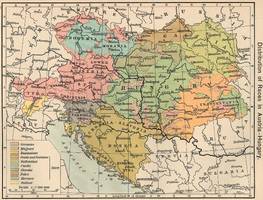
Ordering Diversity. Concepts of Federalism in the Austro-Hungarian Empire and its Successor States
Project term: August 2012 − September 2019
Project leader: Jana Osterkamp
Funded by the Emmy Noether Junior Research Group (DFG)
How does federalism shape social diversity? And how does social diversity shape federalist concepts of order? These are the central questions addressed by a social history of federalism, a history of federalism ‘from below’.
The Emmy Noether Junior Research Group ‘Ordering Diversity. Concepts of Federalism in the Austro-Hungarian Empire and its Successor States’ is funded by the German Research Foundation (DFG) and has been based at the Collegium Carolinum since May 2012.
In approaching the subject of federalism through the categories of nation, economics, religion and region, this project opens up new research perspectives. Until now, the history of federalism as legal history in the German-speaking context has revolved around the sovereignty dogma, tending to address state organisational issues such as the relationship between the Reich and its constituent states. In general historiography, federalism has usually been viewed through the prism of nationalism. Yet we can only really understand federalist concepts of order if consider those economic, religious-denominational and other factors that were just as significant for federalism and concepts of federalism as the national question.
In the junior research group a post-doc works together with two PhD students. The head of the junior research group Jana Osterkamp is a historian specialising in Eastern European history and a legal scholar. She was a research assistant at the Max Planck Institute for European Legal History in Frankfurt am Main before working at the Collegium Carolinum in Munich. Björn Lemke is an economic historian and studied history, political science and economics in Berlin. Sevan Pearson studied history, political science and Eastern European studies in Lausanne and Munich. Two of the projects are concerned with the history of the Austro-Hungarian Empire, with the first focussing on the western half of the Empire and the second on the Austro-Hungarian economic region. The third project examines federalism under state socialism in a case study of Bosnia and Herzegovina.

The achievement of order and concepts of order in economic policy in Austria-Hungary 1897–1910.
Björn Lemke
The Austro-Hungarian dual monarchy was a curious construct, combining elements of a federal state with those of a confederacy. While largely autonomous in their domestic political affairs, both federate states were tenuously linked by their common tasks in areas such as foreign policy and defence. This link was formally strengthened by the existence of a number of imperial financial and economic institutions based on inter-governmental cooperation. They included the customs and trade alliance as well as the joint currency and the central bank. In day-to-day politics these institutions – like the issue of financing common tasks – were a bone of contention between the two confederate states. There was no joint supervision of economic affairs.
Against this background the project asks two questions. Given the significant economic disparities and the conflicts between various nationalities in the Austro-Hungarian Empire, what did this institutional setting – poised between economic integration and autonomy in the sphere of economic policy – contribute to the achievement of order? To what extent did this setting reflect contemporary notions of a sound economy and good economic policy? As understood in the project, institutions have not only social-regulatory, but also subjective-intentional functions. Institutions don’t merely influence what happens in society; they also shape ideas about what constitutes order. Thus the project views economic history as cultural history. Beyond merely enquiring into actual economic output, the project also looks at the non-economic and unintended consequences of a particular institutional setting. One working hypothesis of the project is that the institutions of the Austro-Hungarian Empire were actually quite efficient in spite of their deficiencies. Yet they were increasingly delegitimised as weak and lacking when judged by contemporary concepts of a good system. The project draws on state archival materials (for example documents from the ministries of trade and finance) and contemporary materials on the economy and economic policy (for example journals published by associations which give insights into how industrial associations discussed the dualist economic system and the respective neighbouring state).
Federalism was often seen as a possible political solution – albeit one that was incompatible with economic exigencies – to the conflicting priorities of social integration on the one hand and social diversity on the other. As a sub-project of the Emmy Noether Junior Research Group ‘Ordering Diversity. Concepts of Federalism in the Austro-Hungarian Empire in the Long 19th Century’, this dissertation project is expected to provide new insights into contemporary discussions of the state of affairs in the Austro-Hungarian Empire and alternatives to the dual monarchy.
The Nationalities Policy of the Bosnian Communist League in Bosnia and Herzegovina 1960−1974.
Sevan Pearson (project completed)
At the end of World War II the communists founded the Federal People’s Republic of Yugoslavia, comprising six republics. Each of these republics had a nominal nation; the Slovenes, for example, had Slovenia. Bosnia and Herzegovina represented an exception because Serbs and Croats lived there alongside Slavic Muslims. The national status of the latter remained unresolved until they were gradually recognised as a sixth ethnic group in Yugoslavia in the period from 1961 to 1974. This process dominated the nationalities policy of the League of Communists of Bosnia and Herzegovina (SK BiH), which wanted to grant Muslims rights of self-determination without threatening the fragile balance in interethnic relations between Serbs, Croats and Muslims. Furthermore, the SK BiH was faced with different nationalist demands from each of the three ethnic groups in this period. Until now, the complex nationalities policy of the SK BiH in the period from 1960 to 1974 has not been extensively researched. This dissertation project intends to compensate for this deficit. The sources examined include SK BiH files, e.g. from the Executive Bureau or the Commission for Inter-ethnic Relations.
Wem gehört Bosnien?
Die Nationalitätenpolitik der Kommunisten in Bosnien und Herzegowina, 1943-1974
https://www.ibidem.eu/de/wem-gehoert-bosnien.html
A social history of federalism. Federalist concepts of order in the Austro-Hungarian Empire.
Jana Osterkamp
The Habsburg Monarchy was a laboratory for federal ideas of order in the long 19th century. Jana Osterkamp's habilitation project is dedicated to this phenomenon via the four thematic approaches of nation, economy/finance, religion and region.
With a view to the social heterogeneity of the Habsburg Empire, the project emphasises the integrative and pacifying potential of federal structures. Neither are ideas of federalism interpreted exclusively as centrifugal-separatist, nor are existing inequalities interpreted as deficient from the outset. Rather, the federal ideas of order of the time reveal a sometimes surprisingly modern understanding of rule. Both-as-well-as affiliations of citizens based on overlapping loyalties and identities were just as much a theme as ideas of integration through law and institutions. The planned history of federalism thus also contributes to the question raised in recent research as to why the Habsburg Empire was able to exist for so long.
Federal ideas in the Habsburg Monarchy were generated by society itself and are not to be interpreted merely as a stopgap measure of state damage limitation policy. This contributed significantly to their popularity and high acceptance. The analysis draws on political science and law approaches to federalism in supranational orders and conceptual questions of loyalty and modernity. It is based on the printed documents evaluated in the previous research literature on federalism and - to a greater extent - on archival sources as well as Reichsrat, Landtag and administrative minutes.
The project focuses on the categories nation, region, economy and religion:
Nation and Federalism: The question of nationality has determined previous research on federalism in the Habsburg Monarchy and its successor states. The federalism drafts of the nationalities regularly came under suspicion of pursuing separatist goals. It is promising to question such assessments with the tools of current political science. The latter distinguishes between multiethnic and multinational federalism: one tends to promote assimilation and integration, the other separation.
Region and federalism: Social diversity on the territory of the Habsburg Monarchy was diversity within diversity. Ethnic, confessional, economic and social differences each had different regional patterns of development: units of ethnic homogeneity could, but did not have to, coincide with units of confessional homogeneity. In federal designs, some regions (Galicia or Moravia) therefore appear in different contexts of a historical, national or confessional nature.
Economy and federalism: Thirdly, there is the question of what influence economic infrastructures had on ideas of federal reform. How were the very unequal economic areas taken into account? Another issue is the relationship between the state's economic constitution and the federal order. Thus, the fiscal distribution of tasks at the provincial level in the Habsburg Monarchy had quasi-federal features in the end. Around the turn of the century, a "fiscal equalisation" and a solidarity liability of the states were under discussion.
Religion and federalism: The interest in the interrelationship between religion and federalism is rooted in the history of ideas. The thinking of social "subsidiarity" developed by Catholic social teaching has become paradigmatic for theories of federalism. Protestant influences and Jewish ideas of self-government will also be examined. Furthermore, it will be asked to what extent the territorial internal division of federal order designs was influenced by confessional preferences.
